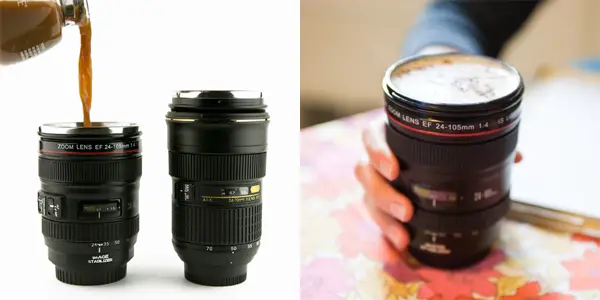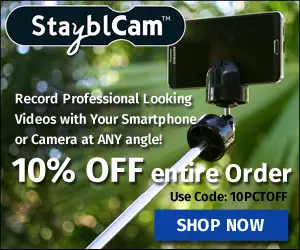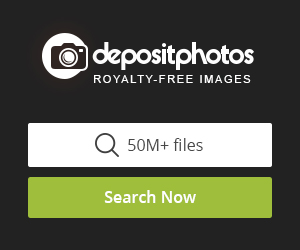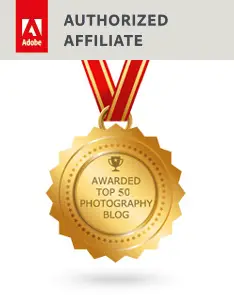The prices of new lenses are rising with every new release. With the leading brands in no mood to reduce the prices of their gear, sometimes I feel that one day we’ll have to sell body parts to buy lenses and other equipment (Nikon, Canon listening?)
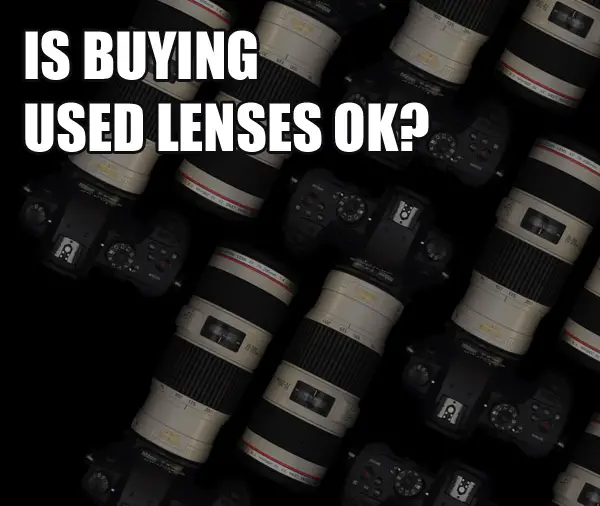
But thankfully, for photographers like us, there is a way out: to buy used or pre-owned lenses. But everyone seems to be asking the million-dollar question: Is buying used lenses OK?
In this discussion, we’ll try to take an honest look at the pros and cons of buying used lenses, and hopefully, by the end of the discussion, we’ll be able to answer that question.
At one point, I decided to upgrade my equipment. I had a 7-year-old D7000, with an 18-105mm kit lens, that I decided to exchange for a brand new D850 and a kit lens. So I contacted one of the stores in my city and asked if I could bring my equipment for exchange. Not many camera stores dealing in new equipment tend to dabble in old items, but luckily this one did.
My lens had a problem in the form of a couple of buttons that often got jammed during use. You press the controls, and they refuse to pop back immediately. They would do it after a while. I explained the problem and told them this needed service, and everything else was in sharp working condition. They didn’t take my word for it and thoroughly tested the equipment before giving me an excellent exchange value.
The moral of the story is that at least I was honest about the equipment I was exchanging, and I know they still had a few working years left in them. Anyone buying it could use it without any issues after proper servicing. If you can get a lens or, for that matter, any piece of gear that comes through a known and reliable source, you know it is, above doubt, an excellent opportunity to get a good piece of gear.
Choosing the right seller
The problem often is that’s not the case. You and the seller can be living in different cities, and you have no one in common to recommend the seller. Generally, when you buy from an online market, the lens comes into your hand only after you’ve already paid for it. At that point, if you find out that the lens has issues, there is no way you can return it.
Even if the seller had mentioned the flaws or imperfections, when the lens reaches your hand, you could find that the deficiencies are more than superficial. It’s important, thus, to choose a seller with the proper credentials and who ticks all the right boxes.
What are those right boxes?
The seller has to be credible, and the lens has to be in good condition. The only way to know if the seller is credible is if they have good reviews in previous deals. This is for online sales platforms like eBay. If the seller has advertised the lens sale on another platform, try to find out as much as possible about the seller. Let’s say you find out someone you know as a photographer is looking to sell his 200-500 f/5.6 lens. You happen to know this photographer by name, but someone who is a mutual friend can introduce you to the photographer. If this works out, you can get hold of the lens before the deal is finalized and satisfy yourself that the lens is in good working condition.
What if the seller isn’t in your common friend circle, and you cannot get the lens in hand before purchase? Insist that you and the seller live in the same city and frequent the same circles. This adds weight to the seller’s words. If you have common circles and the seller is aware of that, he wouldn’t try to mislead you and risk losing his reputation in the common circle.
Buying from a reputed used gear seller is the best way to go about it. You can find excellent used and even old legacy lenses, which are hard to find anywhere at these used gear sellers.
You could find used gear in excellent working condition at a price that’s less than half the price you usually pay for them when you buy them brand new. However, it should be noted that you should always insist on testing the lens out before you part with your hard-earned money. If the seller is unwilling to allow you to handle the lens and try it, then there is no point in continuing any further.
Outright sale by a photographer
A photographer may be looking to sell a lens because they may not need it or wish to update their existing gear, and they’re selling off old, unused, or sparingly used equipment. Many photographers buy equipment on a hunch but later realize they don’t use the gear practically. This happens much too often. Many photographers may be switching gears and don’t want to keep equipment from the old platform with them because they have no use of the same. This is a genuine sale, and if the equipment is in top condition, you could find yourself with a great deal at such a sale.
Not every sale is an attempt to sell a defective piece of equipment
Then again, you could find great deals when someone is upgrading their gear and selling equipment at a bargain. For example, when you know a landscape photographer is selling a telephoto lens, you will figure out that the lens is very sparingly used. Landscape photographers very seldom use a telephoto lens. It’s more of a sports or wildlife and birding photographer’s tool. But if a landscape photographer is selling a telephoto lens, that lens has not seen much use and is in excellent condition.
Some sellers attempt to do just that. Unfortunately, because of the heavy price of camera lenses (and cameras), there is a high risk of getting duped by unscrupulous characters who try to push through defective equipment or damaged equipment. This brings us to whether the lens you’re looking at is a good or a nasty piece. Even if the outer shell is in top shape, the lens could have severe issues with its internal elements having been used in a rough manner. How do you know that the lens is a good piece?
However close inspection you do, it’s not easy to determine if the lens is in great shape. But you can still try and replicate these steps to determine if anything is wrong.
Rattling sound
One of the things that you should do is hold the lens close to your ear and give it a light shake. Does it rattle? A bit of rattling is ok, especially if the lens has image stabilization. However, there will be no crazy rattling like a screw, or a bit has come loose. Those are apparent indications that something isn’t right.
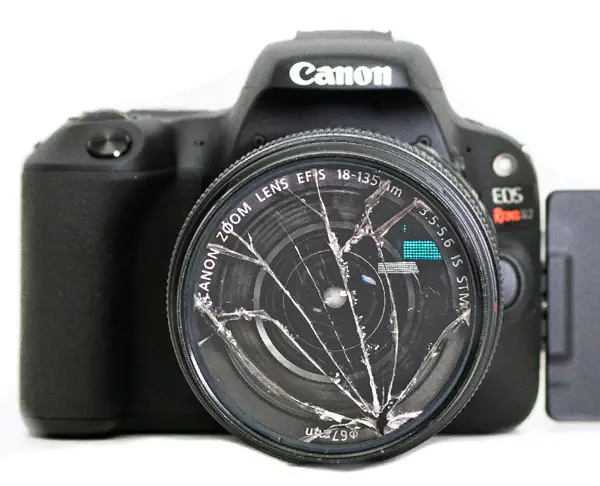
Focus and zoom ring
Another thing that you should check is how the focus and the zoom ring turn. The focus and the zoom ring have a bit of tension, which is evident when you’re using them for the first time. However, this tension or resistance will go away after a while. When buying a used lens, you will likely have a loose the zoom and focus ring. However, they shouldn’t be too loose to feel weird. They should still have a little resistance even after prolonged use. If they do not, that’s a red flag for you.
Check for the buttons and switches on the lens
The buttons and switches on the lens should not feel too loose and not be stuck. When I handed over my old lens, I knew a couple of buttons wouldn’t move back easily and was quick to point them out. They needed a little repair and servicing, and they would be new again. So, check the extent of the problem with the buttons and switches (if any) and see if any have issues.
Scratches and dents
Scratches and dents are the most obvious things to notice on the lens. But I have kept them for the last because they rarely, if at all, affect the functionality of the lens. Scratches and dents are superficial and easily identified. They tend to reflect how the lens has been used over the years. Some photographers are extra careful when it comes to handling their equipment. They’re very organized and are careful when transporting, using, and maintaining their equipment. Others are not so careful and handle their gear with much less care. Lenses belonging to the second category of users are likely to be worn out and have more scratches and dents.
Where to buy used lenses?
There are a couple places where its safe to buy used lenses along with a couple places you should not buy used lenses from and below are the reasons why.
Ebay– rating 3 out of 5
If you have been buying from Ebay in the recent years you’ve noticed how protective of the buyer the platform has become at the expense of the seller. This may seem unfair at first glance, and I’ve had transactions where i was taken advantage of by buyers, but if you are a buyer, this is to your benefit. Ebay buyer protections include a whole step by step system for conflict resolution that again is very buyer friendly. They also hold your payment to seller for a period of time after item is purchased.
The difference between ebay and used camera gear dealers such as KEH is 1) you are still dealing with a private seller who most likely will not accept returns and 2) the Ebay seller protections are not lens or camera gear specific, they are written for all types of items.
Facebook Marketplace– rating 3 out of 5
With facebook marketplace, a person’s sales of items are linked to their facebook profile and there is a place for feedback and reputation. Facebook marketplace buyer protections include contacting Facebook for a refund if product is not delivered, reporting them which may get them unlisted from Facebook,
Even though its not like buying from a reputable used equipment dealer, its way better than buying from someone on Craigslist. You can look at their profile, see if they have a network or have a fake looking profile with one friend, look at their other items for sale, etc.
KEH and photo dealers– rating 4 out of 5
KEH, Adorama, B&H, MPB, and Gear Focus are all respected used photo gear dealers, including lenses. You can buy here most safely due to their testing of equipment and refund policies. Items are graded on a standard level with a letter or number grade and issues with lenses noted. Prices at these dealers, why they may not be the lowest, are quite fair due to competition between stores. I’ve had no problems buying lenses from KEH, B&H and Adorama online yet.
Craigslist– rating 2 out of 5
I would stay away from Craigslist when shopping for used lenses. Unlike facebook marketplace, your seller profile is not linked to a profile like ebay or facebook where there are consequences to misleading the buyer, feedback or ratings.
Having said that, if you see a great deal, are willing to take some risk and do your due dilligence such as observing the items I mentioned at the beginning of this article, agree to meet in a public spot and exchange money safely, you may do well (read this and this). Many have done so after they put in the work. To buy lenses on Craigslist I would reccomend only if you are an experienced photographer who has dealt with lots of used equipment.
Conclusion
Overall, buying used lenses is OK if you’re sure you’re getting a good deal. If you know that the lens is of good quality, that there are no hidden surprises, and that the price you’re paying is also reasonable, why not? You can save a lot of money and get the lens you’ve been looking to buy.
Click here to read our full review of KEH camera online store.


